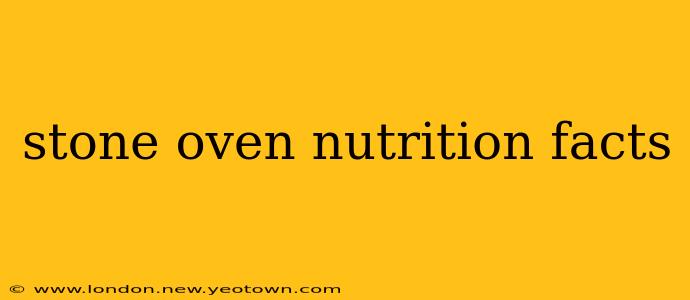The aroma of bread baking in a stone oven – that rustic, earthy scent evokes images of sun-drenched Italian villages and cozy countryside bakeries. But beyond the nostalgic charm, lies a fascinating world of nutrition and culinary history. Let's explore the nutritional aspects of foods baked in a stone oven, and uncover why this ancient method continues to captivate modern palates.
What Makes Stone Oven Baking Unique?
Unlike conventional ovens, stone ovens utilize radiant heat from the oven's stone walls, creating a unique baking environment. This even heat distribution, combined with high temperatures, produces a crispy crust and a soft, airy interior in bread and other baked goods. But how does this impact nutrition?
The intense heat of the stone oven helps to:
-
Develop Maillard Reactions: These reactions occur between amino acids and reducing sugars, creating hundreds of flavorful compounds responsible for that signature crusty texture and rich brown color. While not directly impacting nutritional content, these reactions enhance the taste, making the food more appealing and potentially increasing consumption.
-
Enhance the Texture of Food: The even heat leads to more even cooking, leading to improved texture and reduced sogginess, often making foods more enjoyable to eat.
-
Potentially Preserve Nutrients: Although the extent is debated, some believe that the shorter baking time associated with stone ovens can help retain certain heat-sensitive nutrients compared to conventional ovens, especially in some vegetables. Further research is needed in this area for definitive conclusions.
Does Food Baked in a Stone Oven Have More Nutrients?
This is a question frequently asked, and the answer is nuanced. The baking method itself doesn't add nutrients. However, the superior heat distribution and potentially shorter baking time can help preserve existing nutrients better than other methods. The overall nutritional value still depends heavily on the ingredients used. A pizza made with whole-wheat crust, lots of vegetables, and lean protein will be far more nutritious than one made with refined flour and excessive cheese regardless of whether it's baked in a stone oven or a conventional oven.
What are the Health Benefits of Eating Food from a Stone Oven?
The health benefits are primarily linked to the ingredients, not the oven itself. Stone-oven-baked foods offer potential benefits when they incorporate:
-
Whole Grains: Whole-wheat pizza crust or artisan bread offers fiber, which aids digestion and helps regulate blood sugar levels.
-
Plenty of Vegetables: Stone-oven-baked vegetables retain many vitamins and minerals, contributing to a balanced diet.
-
Lean Proteins: Adding lean meats or plant-based proteins ensures sufficient protein intake.
It's crucial to remember that overconsumption of high-fat or high-sodium toppings, common in pizza and other stone-oven baked dishes, can negate potential health advantages.
How does the Nutritional Content of Stone Oven Bread Compare to Regular Bread?
The nutritional content of bread baked in a stone oven versus a conventional oven is largely dependent on the type of flour and ingredients used. A stone oven might lead to slight differences in texture and browning, influencing Maillard reactions and potentially altering the bioavailability of some nutrients, but the core nutritional profile hinges on the recipe itself. Whole-wheat bread baked in a stone oven, for instance, will generally be healthier than white bread baked in either type of oven.
What are Some Healthy Recipes for a Stone Oven?
The beauty of a stone oven is its versatility! You can bake a wide array of healthy dishes. Think:
- Whole-wheat pizza with a variety of vegetables and lean protein.
- Artisan bread made from whole grains and seeds.
- Roasted vegetables seasoned with herbs and spices.
- Grilled fish or chicken seasoned simply.
Stone oven baking, while offering advantages in texture and flavor, doesn't magically transform the nutritional value of ingredients. The foundation of a healthy diet still relies on choosing whole, unprocessed foods, regardless of how they are cooked. Enjoy the deliciousness of stone oven baking responsibly, and savor the rich history and culinary artistry behind this age-old method.

